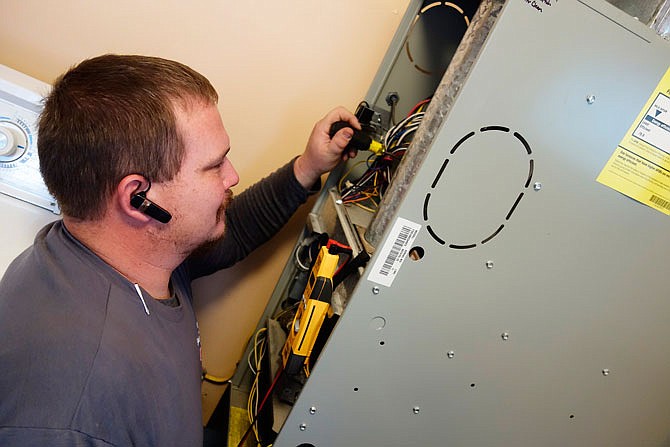There's no escaping it now: Fall is definitely in the air, and furnaces are switching on.
"You should have annual inspections and cleanings," said Brenda Loeffler, who co-owns Garrett & Campbell Inc. with her brother, Bud Campbell. "A good furnace inspection keeps it safe."
It's also advisable to pick up quality furnace filters and change them on a regular basis. Not all filters, however, are created equal when it comes to keeping dust, smoke and pet dander from getting sucked into the furnace and gunking it up. Loeffler said the higher the MERV rating (minimum efficiency reporting value) on a filter, the more efficient it can be. MERV ratings range from one to 16.
Loeffler said any time Garrett & Campbell employees work on a furnace, they make sure it's right and tight - and legal.
"When we go in, we don't leave until it's brought up to current code," she added. "If we come fix it, it will be up to current code."
One thing is for sure: Taking care of a furnace will take care of your household's comfort level.
"Maintenance is the big thing - keeping them serviced and changing the filter regularly," Campbell said. "If you don't, your system will get dirty in time and need to be cleaned."
When they encounter system failures, most of those furnaces are pretty dirty.
Campbell also said people should keep their registers open and not block them with furniture or boxes.
"Your system's sized for the whole house," he said. "Closing off registers may mean your furnace is running 20 percent warmer."
In other words, the money you think you are saving may be lost because you are running a hotter furnace.
"You may not see that much difference in your utility bill," Campbell said of closing off registers.
Responsible caretakers should get to know their home's mechanics.
"Get familiar with your system - what it sounds like, what it looks like when it's running," he said. "If you've got a gas furnace in the house, CO (carbon monoxide) detectors are very important."
Campbell also said these detectors are important if you have an attached garage used to store gasoline-powered equipment including lawn mowers or vehicles. And, of course, get smoke detectors, too, he said.
"Smoke alarms are a necessity," he said.
Campbell said when people have their furnaces checked, make sure gas water heaters are also inspected. Those that vent into brick chimneys should also be checked as moisture and debris can build up inside.
"If you look at your furnace and you see a blue flame, that's a good color," Campbell added. "If it's yellow, it's a sign that it needs to be serviced."
People should keep areas around natural gas furnaces and water heaters clear of boxes and other items. He also warned against vent-free heaters as they tend to suck oxygen out of the air.
"I just don't like them at all - and they don't meet code in Fulton," Campbell said.
Before the real cold weather begins, it's a good idea to scope out your house and tighten it up.
"Seal the perimeters and cracks and crevices," he added. "You're buying utilities. You want to be as efficient with what you purchase as possible."
And if you see, smell or hear something, call someone.
"Just be familiar with your house," Campbell said. "If it doesn't sound right or look right, get it checked."

